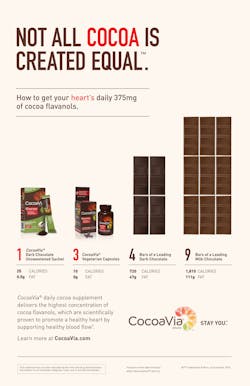Is Chocolate Good For You? Mars, Incorporated Health And Nutrition Director Sets The Record Straight In Time For Chocolate Day
GERMANTOWN, Md., July 6, 2015 /PRNewswire/ -- Chocolate is widely considered to be one of the most beloved foods in the world, with an estimated 7.2 million tons consumed each year. Though a modern day indulgence, cacao – the foundation of all chocolate – has enjoyed centuries-long reputation for a wide range of purported health benefits. As far back as the 16th century, cacao allegedly was used to treat a number of ailments ranging from ulcers to heart palpitations.
Today, researchers from around the globe continue to study the potential health benefits of this treasured treat. To celebrate Chocolate Day on July 7, Dr. Catherine Kwik-Uribe, human health and nutrition director at Mars, Incorporated, one of the world's largest manufacturers of chocolate, is separating fact from fiction and dispelling common chocolate-y myths once and for all.
"There are many common misconceptions about chocolate, especially when it comes to the stories on its health benefits," says Kwik-Uribe. "While there are countless reports on the benefits of chocolate, what many people do not realize is that chocolate is a source of a group of potent bioactives found naturally in cacao, cocoa flavanols. However, not all chocolate is created equal. In fact, the amount of cocoa flavanols in chocolate varies dramatically as traditional processing methods destroy the cocoa flavanols naturally present."
Dispelling Chocolate-y Rumors
According to Dr. Catherine Kwik-Uribe, here are some of most common myths when it comes to people's perceptions of chocolate:
1. MYTH: Chocolate contains powerful antioxidants.
FACT: Chocolate, particularly dark chocolate, contains cocoa flavanols, phytonutrients which science supports have a proven positive impact on health. However, contrary to popular belief, cocoa flavanols are not antioxidants. Based on work done in test tubes, early research suggested the flavanols may act as antioxidants in the body. Today we know that this is not true – that in fact, the benefits of cocoa flavanols to human health are due to their ability to directly influence the function and overall health of blood vessels.
2. MYTH: Chocolate is good for your heart.
FACT: Chocolate can be part of a healthy diet, but it is not a health food. Even if a chocolate is high in cocoa flavanols, the calories, fat, and sugar in chocolate make chocolate an occasional indulgence. A significant body of published scientific research has proven that cocoa flavanols support a healthy heart by promoting healthy blood flow*. Consumption of cocoa supports the body's production of nitric oxide, a compound produced naturally within the body that triggers blood vessels to relax, enabling the smooth flow of blood. This ability of blood vessels to relax is scientifically recognized as a marker of the health of the cardiovascular system.
As chocolate is an occasional treat, one of the most efficient ways to get a daily serving of cocoa flavanols is through a product like CocoaVia®, a daily cocoa extract supplement that leverages the Cocoapro® process to preserve the flavanols naturally present.
3. MYTH: Chocolate containing 70% cacao or greater is good for you.
FACT: While a percentage of cacao as high as seventy percent is likely to contain more cocoa flavanols than a traditional dark chocolate bar, the percentage of cacao is not a reliable indicator of a product's cocoa flavanol content. Further, chocolate as an energy-dense food with fat and sugar should be enjoyed in moderation as an occasional treat. Unless the packaging indicates the cocoa flavanol content or Cocoapro® brand, there is no way to determine if you are receiving the benefits of this powerful plant-based bioactive.
4. MYTH: Chocolate is high in caffeine.
FACT: Chocolate does contain caffeine, but an average 1 oz. serving of dark chocolate contains less than half the amount of caffeine found in an average cup of black tea. The amount of caffeine in chocolate is in proportion to the percentage of cacao in the product, thus milk chocolate contains less caffeine than a semi-sweet or dark chocolate.
According to Kwik-Uribe, "It's important to remember that despite the chocolate-y rumors, chocolate is a wonderful, but occasional treat that can be part of a balanced, healthy diet. Cocoa flavanols are found in chocolate, but the amount of chocolate that has to be consumed to achieve the level of intake shown to exert benefits will generally be far above a 'healthy' amount of chocolate. CocoaVia® daily cocoa extract supplement is a convenient way to include cocoa flavanols in your diet every day."
To learn more about how to receive your daily serving of beneficial cocoa flavanols, visit www.CocoaVia.com.
About Mars, Incorporated
In 1911, Frank C. Mars made the first Mars candies in his Tacoma, Washington kitchen and established Mars' first roots as a confectionery company. In the 1920s, Forrest E. Mars, Sr. joined his father in business and together they launched the MILKY WAY® bar. In 1932, Forrest, Sr. Moved to the United Kingdom with a dream of building a business based on the objective of creating a "mutuality of benefits for all stakeholders" – this objective serves as the foundation of Mars, Incorporated today. Based in Mclean, Virginia, Mars has net sales of more than $33 billion, six business segments, including Petcare, Chocolate, Wrigley, Food, Drinks, Symbioscience, and more than 72,000 Associates worldwide that are putting its Principles into action to make a difference for people and the planet through its performance.
